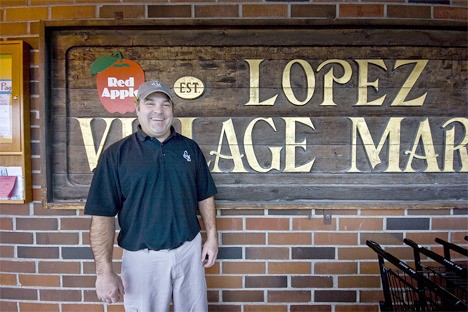The chorus of concern over what will happen to the Lopez Village Market building has been growing. The new market, placed between LoHo and the pharmacy, is due to open in April. The future use of the current market is up in the air and a subject of much debate.
You need only cast an eye down the online discussion thread on “lopezrocks.org” to see the opinions grow more heated. It is a negativity that manager Aaron Dye is eager to dispel.
Originally, in posting the issue for debate on the ‘soapbox’ section of the Web site, web master Povl Lasbo’s intention was innocuous enough. He wanted to open the conversation. And indeed that, to a large extent, is what happened.
Many ideas presented on the online thread echoed those brought up in a previous Lopez Village Planning Committee meeting. “There was a consensus,” says Lasbo of the meeting, describing how the majority was for the old market being recycled as a public, food-related facility. Suggestions included a communal food processing unit, storage freezer space or a communal kitchen.
Laurie Parker, first to post on the lopezrocks.org market debate thread, said that it “could be used for local farmers and producers — long-term root cellar type storage of potatoes, carrots, beets, etc, for canning and storing vegetables and fruits, for processing dairy products, and possibly for storing eggs, and meats from the mobile slaughterhouse.”
Further along the thread the community imagination jumps between options as diverse as a cinema, a roller rink and a non-profit film and media study center. One theme remains central, that the property operates as a community gathering place, Lopez’s own “village square.”
However the online debate over how to achieve this “village square” diverges from purely polite tones. Comments over community rudeness towards the store owners, and fears that the market, when empty, may be left as a “village slum” indicate a debate exacerbated by rumor and unanswered questions.
It is a situation that seems to have gotten ahead of itself, and one that Dye wishes to rope back into control. “People need to relax” says the manager, expressing his concern over the comments on lopezrocks.org. To Dye, the reality is that, already laden with two major projects, managing the current store and organizing the new, he feels he needs time before he can fully take on this third project of the current store’s future.
Speaking for the owners and those who own the real estate of the place, he provides answers to certain fears around future projects. For one thing, the restrictive covenant on the property does not preclude an island food processing facility. This covenant means that no competitors may be installed in the old building, and there is community concern over what this means.
Does a facility that included food, like a processing plant, count as competition? No, says Dye. In fact, there is even the possibility that the covenant may be voided. “It is just to make sure there isn’t going to be a mini-market selling gas,” says the store management. However, they are in full support of any locally produced food-related facility.
The other piece of concern to be dispelled by Dye is the abandonment of the building. The market is arguably one of the most valuable pieces of property on the island, and the idea that Dye and the management would allow it to fall vacant is, according to them, “ridiculous.”
In fact it is this community fear that strikes at the heart of Dye’s personal concern over the whole debate, that the community seems to be forgetting his connections with Lopez. He already voiced this in his comment on the lopezrocks.org thread, “We have 5 kids living here also and we are pretty dug into this Island now and have the potential to be here for a long time. I hope we have done good business here for the island that you don’t think we will leave this a ‘slum’. I am bummed that you think this is a possibility.”
The owners of the market have a long history of generous contribution and community effort and Dye says again that “nobody has to worry”. He has nothing but the community’s best interests at heart. “We’re not corporate people,” he concludes.
A more concentrated planning effort probably will not occur until after the summer rush of business, and until that time Dye hopes that people will “talk to him straight” about their ideas for the store’s future. He himself thinks a rec center for kids might be a good idea.
“Nothing bad is going to happen” says Dye. A new line to be added to the chorus of concern.





